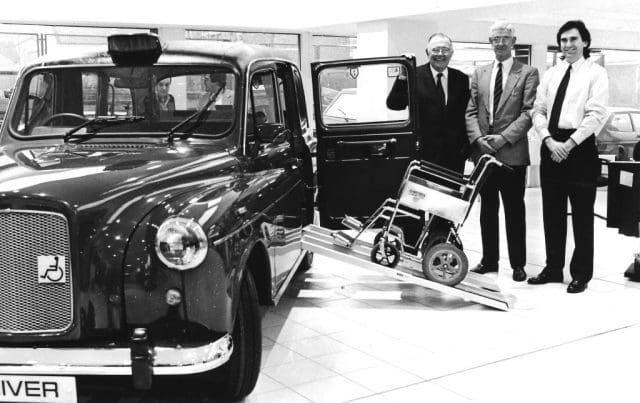Today is International Wheelchair Day, when users celebrate the positive difference a wheelchair makes to their lives. But, despite changes and improvements, it is also a reminder of the difficulties they still face, including using taxis and PHVs.
As seen in our picture of John and Billy Paton introducing the first wheelchair-accessible FX4 Fairway in the late 1980s, modern black cabs are designed with disabled access in mind. But not all public hire taxis follow the traditional black cabs model, and PHVs usually have to be adapted for wheelchair access.
Apart from the practical obstacles of finding a cab that can accommodate a passenger in a wheelchair, they also face the humiliation and frustration of having to wait in all weather for a suitable vehicle to arrive.
As a result of recent incidents in which people with disabilities encountered problems accessing taxis, councils are among those leading the fight for change. This includes calling on the government to change legislation to give local authorities more control over wheelchair-accessible taxis and PHVs.
‘Ridiculous’
The BBC has reported on a shocking story about a man who took a train from Bristol to Gloucester. When he reached Gloucester station, he had to call a wheelchair-accessible taxi from Bristol to take him to his destination in Gloucester because there were none available locally.
The incident prompted Gloucester City Council to hold a special meeting, at which a petition signed by 2,700 people on behalf of another wheelchair user, Luke Griffin, was presented to officials, who were told nine wheelchair-accessible vehicles for a population of 162,000 is not enough.
The BBC reported that Luke asked councillors if they thought it was fair a young disabled man in Gloucester could not live an equal life.
Speaking about the Gloucester station incident, Councillor Alastair Chambers told the meeting: “It’s absolutely ridiculous. He got the train from Bristol to Gloucester and then has had to wait for a taxi from Bristol to pick him up because there aren’t any.”
Another councillor revealed that a wheelchair user wanted to go out for an evening meal to celebrate her wedding anniversary, but despite calling weeks in advance, could not book one any later than 3pm.
Councillor Hannah Norman explained that there are five Hackney carriages and four private-hire vehicles that are wheelchair accessible in the city, but there is no legislation that requires them to be operated 24/7.
In a bid to increase numbers, the council has approved new incentives for taxi drivers to provide more disability-friendly cabs and PHVs, including a 50% rebate on operator licences to those who can evidence at least one wheelchair-accessible vehicle available for bookings during all evenings and during weekends.
It will also write to the government to change legislation to allow local authorities to control operating hours of WAVs.
Assistance dogs
In neighbouring Wiltshire, a disabled man who collapsed through exhaustion said he was left “devastated and humiliated” after he was refused two taxis because he had an assistance dog.
Wiltshire Gazette and Herald reported that Edward Jones, 46, was twice ignored by taxi drivers outside Chippenham railway station because of his dog, George, which helps him with his mental health.
Wiltshire Council cabinet member for transport Councillor Caroline Thomas said: “After investigating Mr Jones’ complaint, we have revised the wording in our taxi guidelines to make it absolutely clear to taxi drivers that guide dogs and assistance dogs must be carried, and it is illegal to refuse to do so.
“In addition, customers who state that their dog is an assistance dog are under no legal obligation to prove this, meaning that any dog classed as an assistance dog must be carried, unless the driver has a medical exemption from carrying dogs.”
The Equality Act 2010 states taxis must carry guide dogs and other assistance dogs.




